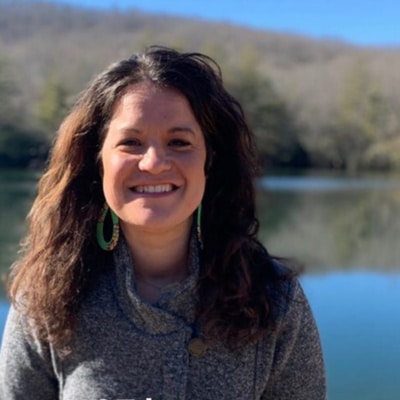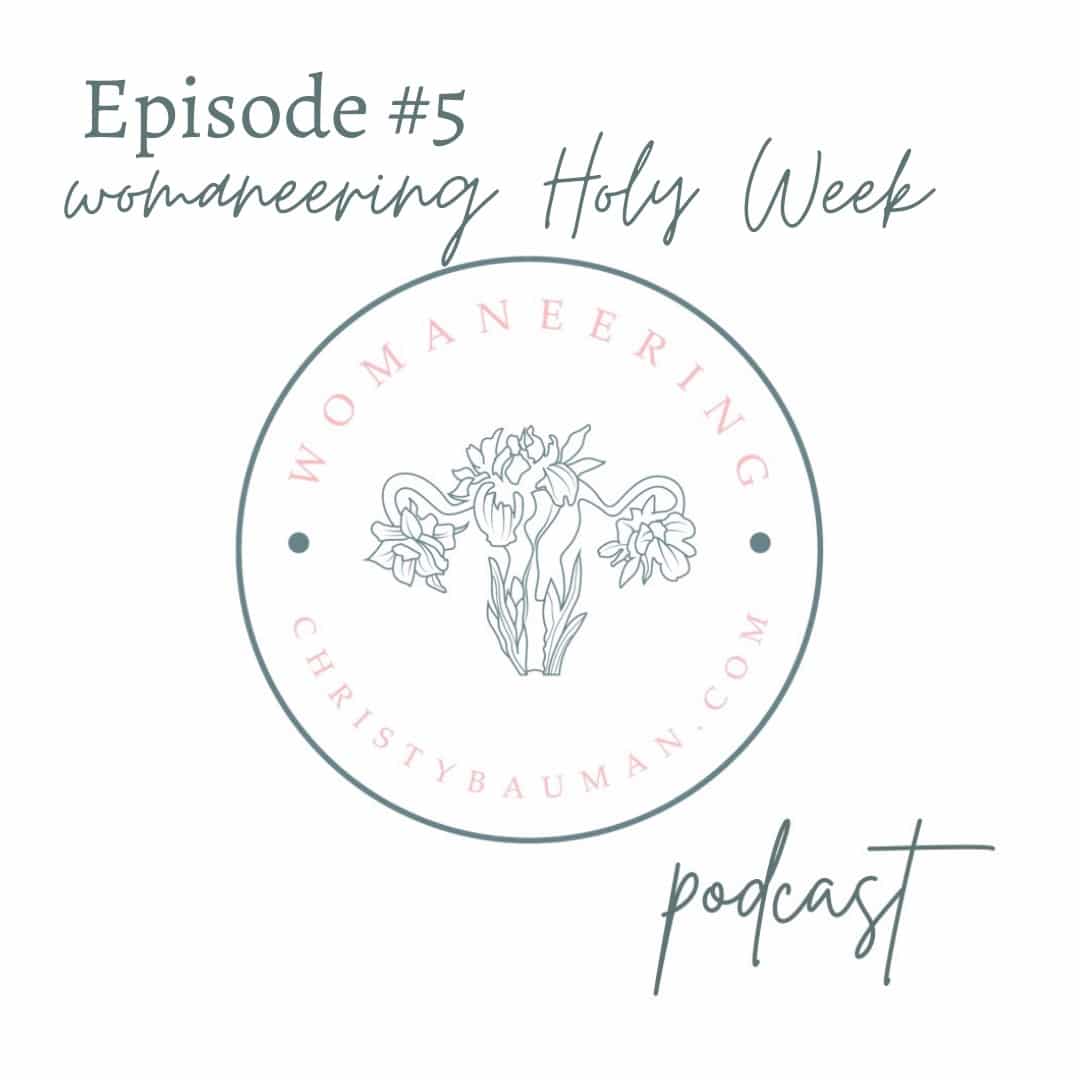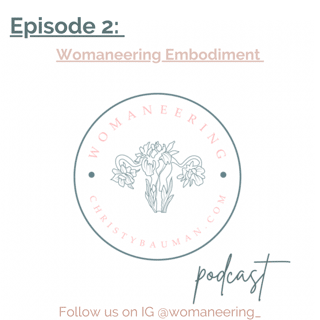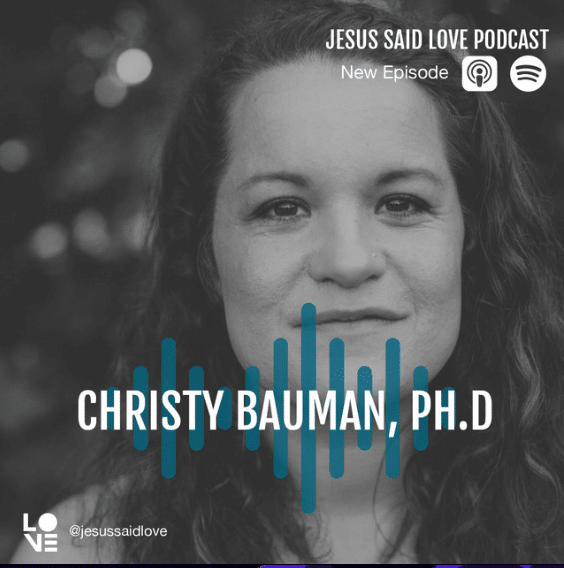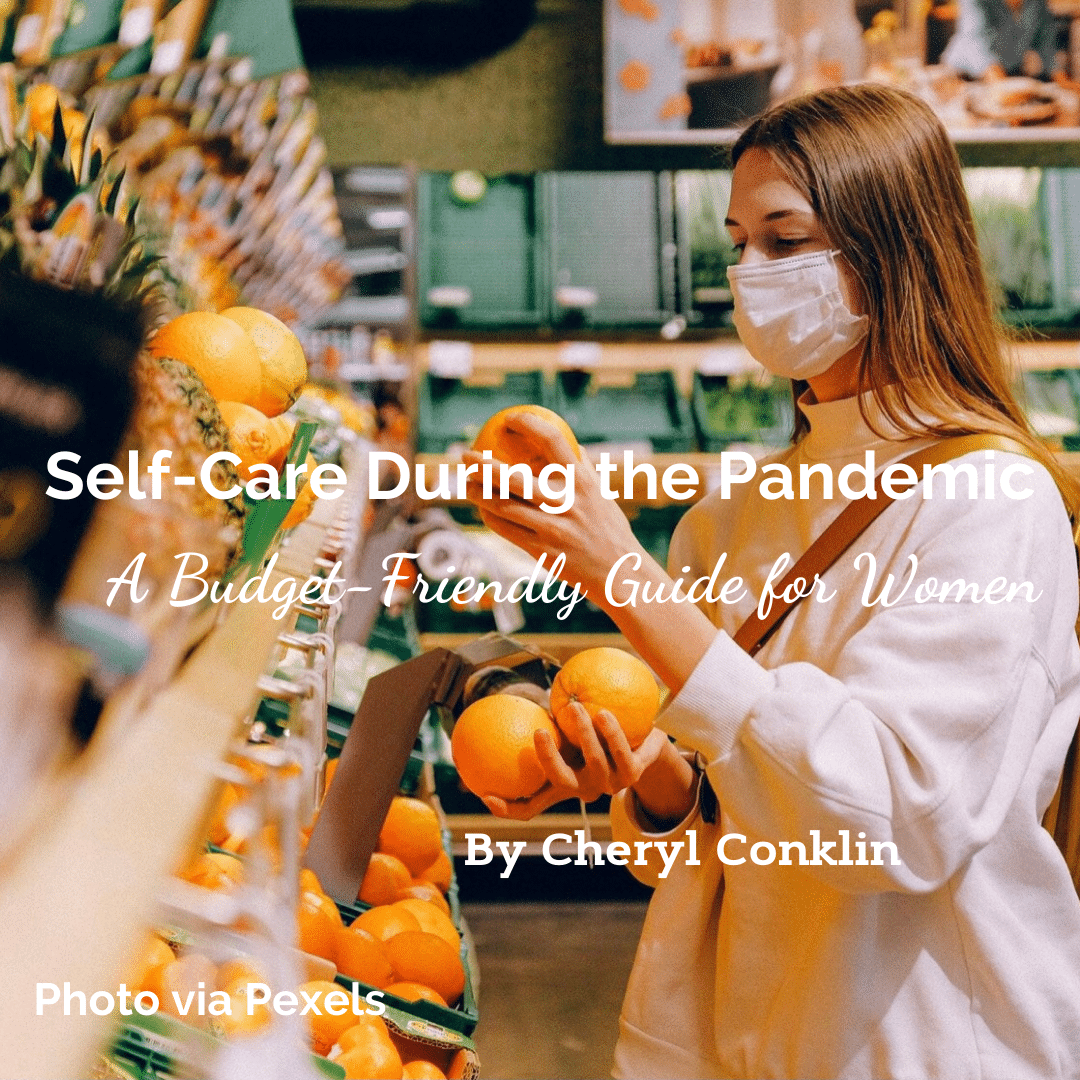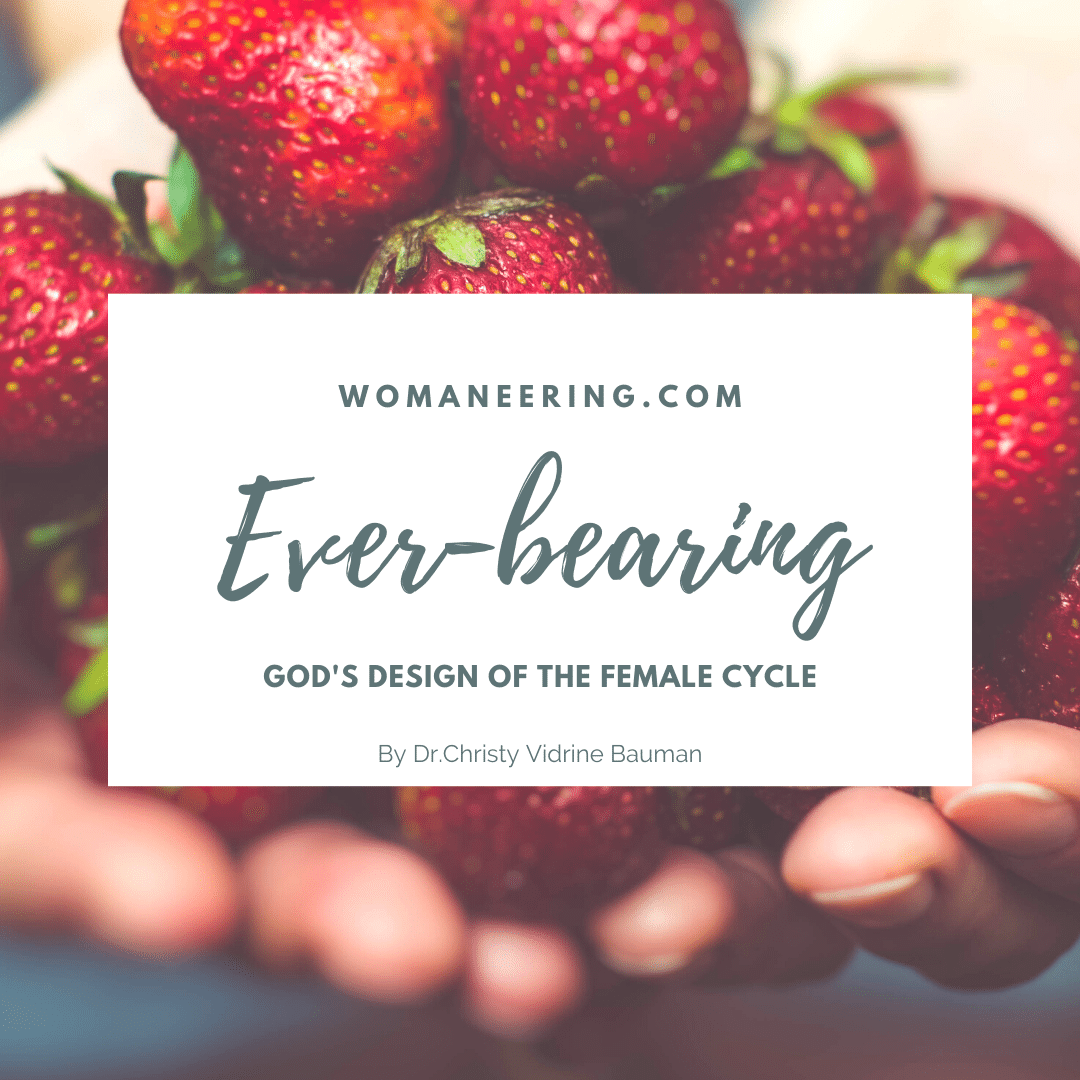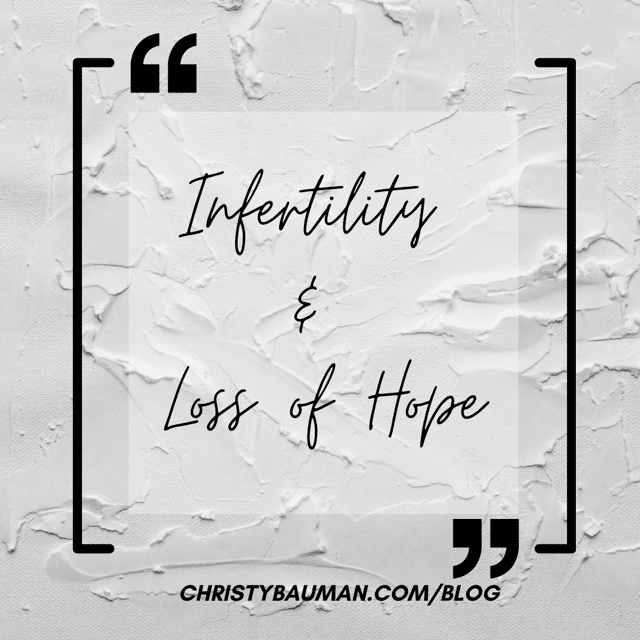Womaneering Holy Week
As we begin holy week, this conversation in womaneering podcast couldn’t have come at a better time. Tracy and I navigate what it means as women to live fully into our bodies through holy week. The theme of our conversation is around what is required for a woman to birth death and to be a doula in the life/death/life cycle. Join us please as we help you spiritually prepare to know Jesus in His crucifixion and resurrection through the body of a woman. Join us for the conversation on the Womaneering Podcast and follow us on IG at womaneering_
Womaneering Sexual Health
Dr. Christy Bauman and Tracy Johnson continue the conversation about pioneering Christian womanhood in this episode about sexual health. Andrew Bauman joins to share his story about objectifying women’s beauty. The conversation engages topics of pornography, sexual shame, and asexuality. Join us for the conversation on the Womaneering Podcast and follow us on IG at womaneering_
Self-Care During the Pandemic: A Budget-Friendly Guide for Women
The pandemic has changed the lives of countless women around the world. Before the pandemic, women held the majority of the jobs in the food, hospitality, and tourism industries — all of which were hard hit by the pandemic. Beyond grappling with the economic effects of the pandemic, women have also had to take on new roles at home. Given the increased demand for your time and mental energy, practicing self-care is more important than ever right now.
One great way to care for yourself is by working with a therapist who specializes in women’s health and well-being, like Christy Bauman. Keep reading to learn what else you can do to feel your best during the pandemic — without blowing your budget!
Get Active
As Verywell Mind explains, exercise is an effective form of stress relief that can have a very positive impact on your mood. If you’re feeling overwhelmed by the pandemic, bumping up your activity levels could be a great way to cope. Pick up running, hiking, or cycling. Getting outdoors is always best, but if you feel safer staying close to home, try following some at-home workout videos in your living room — there are plenty of free routines you can find on YouTube, as well as fitness apps that cost little to nothing.
Treating yourself to new athletic apparel can help you get motivated for your new exercise routine. For example, a new pair of leggings or a workout tank from Lululemon will make you feel beautiful and confident as you venture outside for an exercise session. Search online for Lululemon coupons before shopping so you can save money and stick to your budget.
Eat Well
Eating well goes hand in hand with regular exercise. Eating healthy, nutrient-packed foods will keep your blood sugar stable so you can enjoy consistent energy and emotional stability throughout the day. This will make it much easier to stay calm when your spouse or children leave unwashed dishes in the sink. Good nutrition will also improve your mental focus so you can plug away at your remote job, despite all of the distracting things going on around you.
Eating healthy can even help you save money. Steer clear of pre-packaged products and stick with fresh fruits, vegetables, whole grains, and lean proteins. You’ll be surprised how affordable healthy eating really is when you shop smart and cook everything from scratch.
Go to Bed Early
Alongside healthy eating and exercise, sleep makes up the third pillar of health. It’s also one of the most overlooked elements of a healthy lifestyle. If you’ve been taking on additional roles around the house during the pandemic, there’s a good chance your sleep is suffering. But getting enough sleep every night is vital to stress management, emotional coping, mental focus, and more.
Thankfully, you don’t have to splurge on expensive sleep gadgets or a fancy mattress to improve your sleep. Sticking to a regular sleep schedule — even on weekends — is the best way to fall asleep quickly and wake up more easily in the morning. Better yet, get outside in the sunlight immediately after waking to reset your body’s internal clock.
Spend Some Time Alone
With everyone stuck at home, it’s hard to find time for ourselves. But a little alone time here and there can do your mental health a lot of good. Women are all too familiar with the feeling of being needed, and while this is often a wonderful thing, it can get old after a while. Running around, tending to everyone can cause you to lose sight of your own needs. Carve out some time for yourself to take a solo walk, go for a drive, relax in a hot bath, or lock yourself in the bedroom with a book. You don’t have to spend a dime to give yourself some much-needed attention.
Pick Up a New Hobby
Making time for a personal hobby is a fantastic way to disconnect from the demands of life and practice self-care. Fortunately, the pandemic is a great opportunity to pick up affordable hobbies you can do from home. Find a used guitar and learn how to play, try soap making, rehab your furniture, or start an indoor herb garden — your options are nearly endless! Pouring your heart into something you’re excited about can be a breath of fresh air during the monotonous days of the pandemic.
The importance of self-care during COVID-19 cannot be overstated. Exercise, eat healthy foods, get enough sleep, and make time for things that matter to you. Whether you’re caring for a household full of kids or you’re still getting the hang of remote work, finding ways to care for your mental well-being will help you cope as we ride out the rest of the pandemic.
Do you need to talk to someone? Christy Bauman can help you identify your needs and learn how to live more fully. Check out the website to learn more!
For more information about Cheryl and Wellness Central, click here.
Womaneering Sexuality
Trigger Warning: this episode contains explicit stories of sexuality and rape. Please join Tracy Johnson and Dr. Christy Bauman for conversation around women’s sexuality within Christianity. More information at womaneering.com
Everbearing: The Female Cycle & God
**Trigger Warning: There are explicit content and description of miscarriage, loss, and death.
The mist of rain falls on my unwashed hair and flannel pajamas. It is another overcast, cool morning, and the garden beds adjacent to my house have been beautifully tilled, yet I can’t stop harrowing the soil. My exhale sends a heavy cloud of condensation in the perfectly rounded out holes I am digging out. I have about twenty strawberry starters lined in a row by my rain boots, and my nails are packed with dirt. I feel wearily alive. It has been only a few weeks since my D&C procedure, this is the second miscarriage in eleven months and my body is desperate and determined to grow something that will live. So I plant each one of those strawberry plants as proof that I can keep something alive. My husband was gentle when he asked why I had spent over $300 on plants this month. It took a while to put words to but I realized that I was exhausted by so much loss and death, I wanted to surround myself with living things. The Holy Spirit is speaking to our human bodies throughout the seasons, igniting a desire in us to create. We as women are everbearing creatures, whether we want or don't want to raise children, whether our wombs are able or not able to bear children, whether we have stories of losing children, adopting or birthing children...
Women are everbearing creatures.
Our bodies are everbearing the cycle of life and death, our ovaries and uterus, in particular, are everbearing the cycle of hope and loss.
We see this cycle again and again throughout Scripture. Isaiah 5 is one of my favorite examples of this. God is singing a song about what it is like as a parent to watch your son get his heart broken in his covenant relationship with human beings.
[EXT]“I will sing for the one I love
a song about his vineyard:
My loved one had a vineyard
on a fertile hillside.
He dug it up and cleared it of stones
and planted it with the choicest vines.
He built a watchtower in it
and cut out a winepress as well.
Then he looked for a crop of good grapes,
but it yielded only bad fruit.”[/EXT]
The verse always gives me chills.
It reminds me of the helpless parental heart which cannot make someone love their child; the futility a parent feels when their child gets their heart broken by a lost love or a lost dream. One of my favorite worship songs is entitled the Garden Song, which I imagine worship leader Jason Upton wrote after studying Isaiah 5:
[EXT]“I want to build you a garden, in a dry and desert land, I’m gonna find a river there.
For I have seen a garden grow in a land filled with injustice
and I have heard a mother’s cry for her child to live again.
I have seen a withered soul fall like petals on the water,
and I watched a flower grow,
I have seen the power or resurrection, slowly rise toward the sun.
No one knows what God has seen,
human kind destroyed this garden,
with bleeding hands we will plant the seeds,
and You will make all things new again,
God will make all things live again. ” [/EXT]
The process of creating a child is filled with awaiting hope, injustice, trauma, healing, celebration, longing, pain, and resurrection. It is much like this parable of the vineyard, which is a womb where God is trying to build a lush garden that gets destroyed because it is trying to grow in a fallen world. The Garden Song is a beautiful response to the brokenhearted Creator; it is a song I have tried to sing back to God in the years of my pregnancies. In the weeks of desperate waiting for a pregnancy to reach the 12-week mark, or when I have wept with blood on my hands when my baby never made it to a viable life, I have made this my prayer.
Co-creating life with God has made me a woman who has contended with faith and hope. Living through the ups and downs of a decade of reproduction, I have become a brave and wild woman who sings with faith, hope, and love. Each one of us has a birthing story, whether it is that we never had the courage to try, or we easily brought life into this world without struggle. Our birthing story tells us how we will come to the last stage of our lives, how we will lay down and die. I know my birth story and the story of my birthing years, and I will tell you this much, I will dance into my death as an autumn leaf falls to the ground.
I ask you to study the cyclical pattern that unfolds in your menstrual story, in your birthing years;
how do you come to the creation process?
Infertility & Loss of Hope
*This is an excerpt from the book, "Theology of the Womb", **Trigger warning: this article is about miscarriage and infertility
Nineteen, twenty, twenty-one, little yellow birds perched in a tree, four are painted blued with life and the other seventeen painted yellow with loss. The framed picture in my sister-in-law’s living room of twenty-one birds in a tree signifies her family, 17 yellow painted birds representing her children in heaven, and 4 blue painted birds signifying her children on this earth. The verse in Ephesians is printed clearly underneath the tree which reads, “to Him who is able to do exceedingly abundantly beyond all that we ask or think.”
She often remarks that abundance is different than she originally thought.
Reproduction was a long road for her, filled with years of giving herself injections, taking pills and medication for the hormonal increase, countless waiting rooms, and doctor visits. The agony of waiting and waiting to know if these embryos took, wondering if the implantations were successful. The warrior of a woman it takes to live through this process astounds me. The Proverb often comes to mind when faced with a longing unfulfilled, “Hope deferred makes the heart sick, but a longing fulfilled is a tree of life.” How many sick hearts I have encountered over the years. My own sick heart at many seasons in my life, but the heart of a woman who longs for children and cannot have them has been one of the sickest hearts I have ever known.
The women I have seen for therapy or done life through seasons of infertility, miscarriage, or a child’s death have been the heaviest of hearts. Infertility is referenced as the “shriveled womb” in the Bible, and I would even explain it more as a shriveled heart. The incapability of creating a child within you, if it is a desire you have, is devastating. Women and medicine have become desperate and brave by seeking alternative means such as in vitro fertilization or IVF, in which the art of creating children becomes a science. I feel deep gratitude for science allowing women to get pregnant while realizing the cost of co-creation with God through a petri dish is daunting at best.
Pelvic floor specialists report that trauma held in the pelvic floor due to traumatic D&Cs and births are prevalent. Research states that over 90 percent of women who undergo surgeries in their abdomen will have scar tissue problems, because “the female pelvis contains a remarkable array of structures, responsible for myriad complex processes. It is situated in an area of the body that is vulnerable to injury, accessible to objects from the external environment, and susceptible to infection. When structures in the pelvis heal, they can become bound by adhesions...causing pain and dysfunction.”
Our wombs are sensitive and powerful, fashioned by the Creator to bear witness to the complexity of creation...
Do not be fooled, the invitation to create is one of agony and glory.
Do not be fooled, the invitation to create is one of agony and glory, sometimes found in a petri dish and other times in sacred acts of intimacy. We must honor the process of healing when the womb is harmed for it is our sanctuary made up of that which is most holy.
When we bleed, whether years of infertility or miscarriage, something is being shed. Whether it is the potential for life, or life itself, it is being shed and we have nothing we can do at that moment but to stare down the invitation to mock death. I have feared death too long, fear only can be immersed in perfect love. I have few choices while on earth but one I do have in the face of loss and death is to choose to weep honorably and love deeper than I choose fear. I weep for injustice, I weep for loss, I weep for the pain of hope, the discipline of waiting, the ache to birth, and grief of death. I imagine God, receiving this gift of mine, whether is my blood, my low-grade eggs, an undeveloped fetus; whatever I am offering, it is a gift, my attempt to desire and create life. Can you see God asking you to carry the futility? That may look different for you depending on your story: maybe God is asking to continue trying to create or to let go of life not created. This intimate, sacred, painful image is my kindest, most loving thoughts. My fears being drowned by perfect love. There is an aftermath for the body that continues to attempt to create and remains infertile.
Postpartum is not only for the woman who has had babies but also for the post-partum for the infertile woman.
Postpartum refers to the period of time for the mother after the birth and the postnatal care of the baby, it involves the sharp drop in the hormones progesterone and estrogen, which contribute to feeling tired, depressed, and sluggish. Postpartum, in particular to postpartum grief, is only recently being addressed in the medical world. The range of emotions in a woman after childbirth or child loss oscillates between longing attachment and bliss to protective nightmares and panic-ridden anxiety. The mother's brain shifts as the gray matter become more concentrated. We see changes in the prefrontal cortex, amygdala, and all the regions of the brain that control empathy, social interactions, and anxiety. When a woman is in recovery from infertility, miscarriage, or birth, one must be aware that it is hard to explain what is happening in the brain and the healing process of postpartum. It is helpful to engage anyone in a season of postpartum with curiosity and care through this transition period.
Loss and grief have many symbolic similarities to birth, and in many ways, we give birth to death. In the aftermath of a loss, the burial process has looked, to me, a lot like postpartum grief. Postpartum is different for everyone, and I think the same is true with postpartum grief. Often after one has a baby we ask the question, “How was the birth?”. The same is appropriate for the postpartum griever; we should ask, “How was the death? How was the miscarriage? How was the attempt amidst infertility?”. Whether death is difficult and painful or worthy of the celebration of reaching eternal life is dependent on the details of the death, much like the details of birth. How did one come to die? Were they sick or in pain? Was there family nearby? Did they get to say goodbye to everyone they desired or were they taken too quickly? Was it accidental, intentional; timely, expected? These answers don’t tell us whether one should grieve more or less around this loss, rather it gives us details of how the person grieving might encounter the next few months of postpartum grief.
With the "shriveled womb" of infertility, we must be people who come alongside and be curious about the "sick heart" of the infertile woman and how her post-partum is affecting her heart, body, and mind.
Womaneering Embodiment
Dr. Christy Bauman and Tracy Johnson continue the conversation about pioneering Christian womanhood. Christy shares a story of her journey of sexuality through the purity movement of the Western church culture and what it has cost her in her sexual health and her marriage. Tracy and Christy unpack the understanding of embodiment and women's sexual health as it pertains to Christianity. Join us for the conversation on the Womaneering Podcast and follow us on IG at womaneering_


